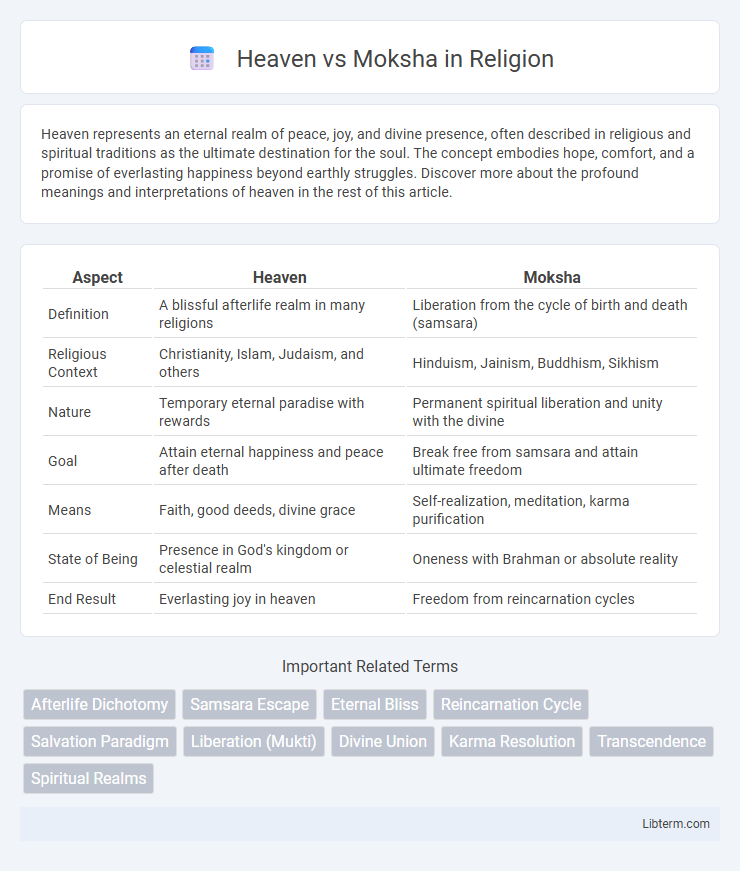Heaven represents an eternal realm of peace, joy, and divine presence, often described in religious and spiritual traditions as the ultimate destination for the soul. The concept embodies hope, comfort, and a promise of everlasting happiness beyond earthly struggles. Discover more about the profound meanings and interpretations of heaven in the rest of this article.
Table of Comparison
| Aspect | Heaven | Moksha |
|---|---|---|
| Definition | A blissful afterlife realm in many religions | Liberation from the cycle of birth and death (samsara) |
| Religious Context | Christianity, Islam, Judaism, and others | Hinduism, Jainism, Buddhism, Sikhism |
| Nature | Temporary eternal paradise with rewards | Permanent spiritual liberation and unity with the divine |
| Goal | Attain eternal happiness and peace after death | Break free from samsara and attain ultimate freedom |
| Means | Faith, good deeds, divine grace | Self-realization, meditation, karma purification |
| State of Being | Presence in God's kingdom or celestial realm | Oneness with Brahman or absolute reality |
| End Result | Everlasting joy in heaven | Freedom from reincarnation cycles |
Understanding the Concepts: Heaven and Moksha
Heaven is often understood as a celestial realm in many religions where souls enjoy eternal happiness and reward after death. Moksha, a central concept in Hinduism, Buddhism, and Jainism, represents liberation from the cycle of birth, death, and rebirth (samsara), achieving union with the ultimate reality or self-realization. While Heaven denotes a place of eternal bliss, Moksha signifies freedom from material existence and spiritual enlightenment beyond physical realms.
Historical Origins in Major Religions
Heaven in Christianity and Islam originates from ancient Abrahamic beliefs emphasizing eternal reward after judgment, rooted in scriptures like the Bible and Quran. Moksha, central to Hinduism, Buddhism, and Jainism, emerged from the Indian Vedic traditions and Upanishads, representing liberation from the cycle of birth and rebirth (samsara). These contrasting concepts reflect distinct religious understandings of the afterlife and spiritual liberation across major world religions.
Heaven in Abrahamic Traditions
Heaven in Abrahamic traditions is depicted as an eternal paradise where the righteous experience God's presence, peace, and reward after death. It is characterized by spiritual bliss, reunion with loved ones, and freedom from suffering, often described in scriptural texts such as the Bible and Quran. Heaven serves as the ultimate goal for believers, contrasting with Moksha in Hinduism, which emphasizes liberation from the cycle of rebirth and union with the divine essence.
Moksha in Hinduism, Buddhism, and Jainism
Moksha in Hinduism, Buddhism, and Jainism represents ultimate liberation from the cycle of birth and rebirth (samsara), contrasting with the concept of heaven as a temporary reward. In Hinduism, moksha is achieved through self-realization and union with Brahman, transcending material existence. Buddhism defines moksha as Nirvana, the cessation of suffering and desire, while Jainism emphasizes moksha as the soul's release from karmic bondage through strict ethical conduct and asceticism.
The Pathways to Heaven and Moksha
The pathways to Heaven in many religious traditions often involve faith-based practices, adherence to moral laws, and rituals aimed at achieving divine favor and eternal reward. Moksha, central to Hinduism and other Dharmic religions, is attained through spiritual knowledge (jnana), righteous action (karma), devotion (bhakti), and meditation (dhyana), leading to liberation from the cycle of birth and death (samsara). Both concepts emphasize ethical living, but Moksha stresses self-realization and union with the ultimate reality (Brahman) beyond the physical realm.
Spiritual Goals: Reward vs. Liberation
Heaven represents a spiritual goal centered on reward, where souls experience eternal bliss as a consequence of virtuous actions, emphasizing moral behavior and divine grace. Moksha, in contrast, signifies liberation from the cycle of birth, death, and rebirth (samsara), achieving self-realization and union with the ultimate reality (Brahman). While heaven is a state of eternal happiness granted by a deity, Moksha embodies freedom from all worldly attachments and the cessation of karma, marking the pinnacle of spiritual evolution in Hindu philosophy.
The Role of Karma and Morality
Heaven in many religious traditions is viewed as a reward for good karma and moral actions, where souls experience eternal bliss based on their virtuous deeds. Moksha in Hinduism and Buddhism represents liberation from the cycle of birth and rebirth (samsara), achieved by transcending karma and moral attachments through self-realization and spiritual discipline. While heaven emphasizes moral actions leading to a positive afterlife, moksha focuses on overcoming karma altogether to attain ultimate freedom and spiritual enlightenment.
Afterlife Experiences Compared
Heaven in many religious traditions is depicted as an eternal paradise where souls enjoy divine presence, bliss, and reward after judgment, often described with vivid imagery of light, joy, and peace. Moksha, central to Hinduism, Buddhism, and Jainism, represents liberation from the cycle of birth, death, and rebirth (samsara), leading to the soul's union with ultimate reality or the cessation of individual existence and suffering. Unlike the personalized eternal dwelling in Heaven, Moksha emphasizes transcendence beyond worldly dualities, signifying freedom from all karmic bonds and the end of existential cycles.
Philosophical Implications and Interpretations
Heaven and Moksha represent distinct philosophical goals reflecting divergent cultural understandings of ultimate liberation and fulfillment. Heaven, often depicted as a paradisiacal afterlife in Abrahamic traditions, emphasizes eternal reward and divine presence, underscoring a dualistic worldview separating soul and creator. Moksha, rooted in Hindu and Jain philosophy, signifies the release from the cycle of birth and rebirth (samsara) through self-realization and union with the absolute, highlighting non-dualistic metaphysics and self-transcendence.
Contemporary Relevance and Personal Beliefs
Heaven and Moksha represent distinct concepts of ultimate freedom and fulfillment, with Heaven rooted in Abrahamic traditions promising eternal paradise, while Moksha in Hinduism and Buddhism emphasizes liberation from the cycle of rebirth. Contemporary relevance of these beliefs influences personal values and life choices, shaping ethical frameworks and spiritual practices in diverse cultures. Individuals often integrate these ideas into their worldview to find meaning, cope with mortality, and seek transcendence in a rapidly changing society.
Heaven Infographic

 libterm.com
libterm.com